
Cut AI Chaos with the Right Compliance Platform
Managing compliance in AI-driven industries like healthcare, finance, and legal services demands precision and security. From safeguarding sensitive data under HIPAA or GDPR to tracking AI workflows for regulatory audits, today's top platforms simplify these challenges. Key players like Prompts.ai, IBM watsonx Orchestrate, Microsoft Azure ML Orchestration, AWS SageMaker Pipelines, and Domino Data Lab offer tailored solutions for governance, security, and cost management.
| Platform | Best For | Key Strengths | Pricing Model |
|---|---|---|---|
| Prompts.ai | Budget-conscious teams | Cost-efficient, multi-LLM access | Pay-as-you-go TOKN credits |
| IBM watsonx | Large enterprises in regulated sectors | Advanced governance, audit tools | Per-user licensing |
| Azure ML | Microsoft-centric organizations | Integration with Microsoft ecosystem | Consumption-based |
| AWS SageMaker | Tech-savvy, high-volume teams | Scalability, serverless architecture | Usage-based |
| Domino Data Lab | Regulated industries | Automated compliance, certifications | Enterprise pricing |
Each platform balances compliance, cost, and usability uniquely. Choose based on your industry needs, team expertise, and existing infrastructure.
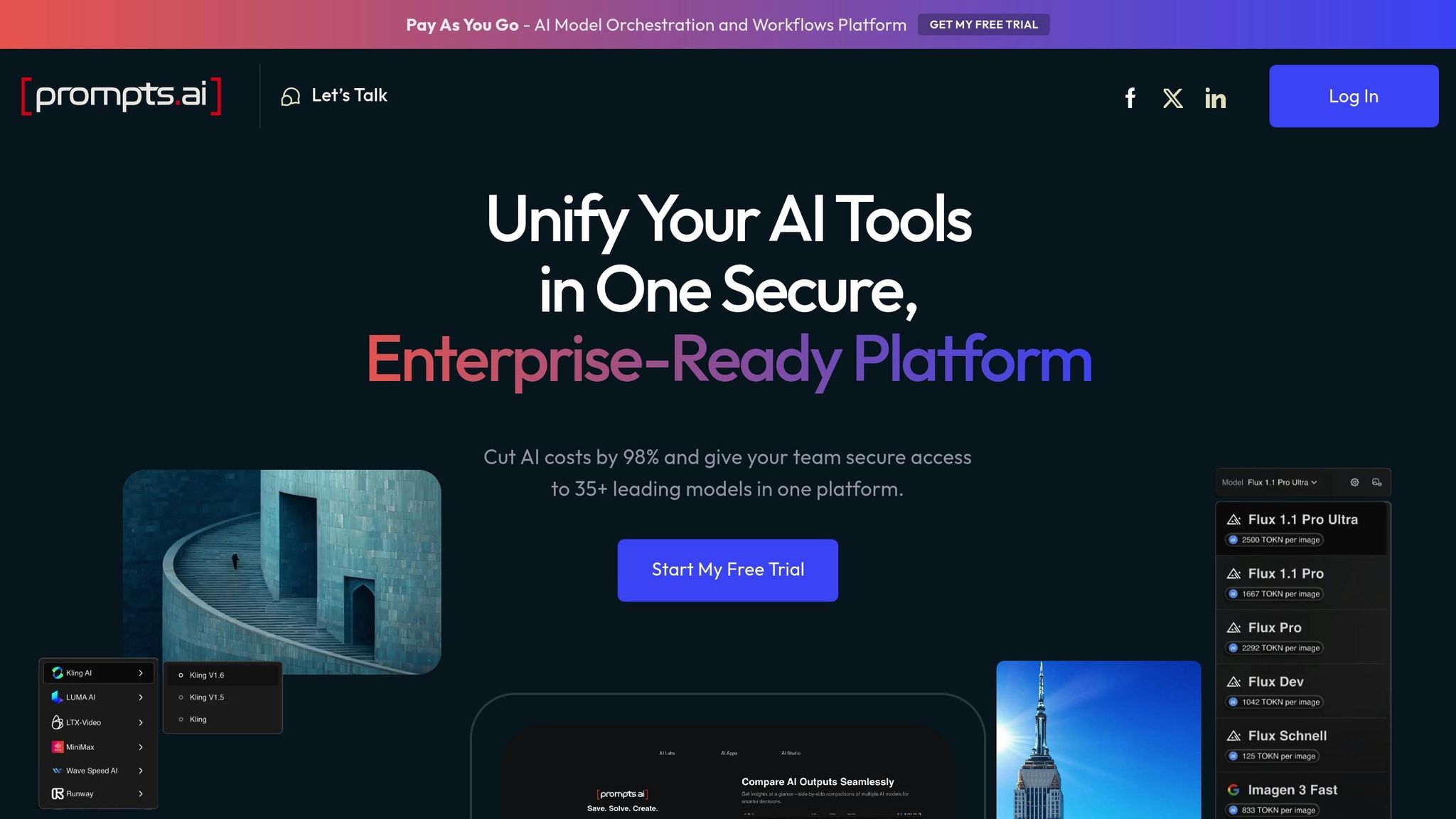
Prompts.ai is a powerful platform designed to simplify AI adoption for enterprises. By integrating over 35 leading large language models - such as GPT-5, Claude, LLaMA, and Gemini - into one secure hub, it eliminates the hassle of juggling multiple tools. This unified approach reduces fragmentation while ensuring strong oversight and cost clarity.
Prompts.ai is built with stringent governance controls to keep sensitive data safe within an organization's boundaries. With detailed access settings, teams can implement role-based permissions and maintain clear security protocols. These features are particularly valuable for organizations that must meet strict compliance requirements, seamlessly combining security with the platform's orchestration capabilities.
The platform turns sporadic AI experiments into reliable, standardized workflows. By consolidating multiple AI models into a single workspace, Prompts.ai simplifies processes and reduces compliance risks. Teams can create and deploy consistent prompt workflows while comparing model performance side by side, ensuring dependable outputs that align with regulatory standards.
To further enhance efficiency, Prompts.ai includes a built-in FinOps layer. This feature provides real-time insights into AI spending, helping organizations manage costs effectively without compromising compliance.
Prompts.ai offers comprehensive audit tools to track AI interactions and workflow activities. Real-time dashboards provide visibility into usage, spending, and performance metrics across teams and models. These features make it easier to document compliance and prepare for audits with confidence.
In addition to its extensive capabilities, Prompts.ai delivers exceptional cost efficiency. Using a Pay-As-You-Go TOKN credit system, the platform aligns expenses with actual usage, offering potential savings of up to 98% compared to managing separate tools. Pricing starts at $99 per member per month for the Core plan, with Pro and Elite tiers available at $119 and $129 per member per month, respectively. All plans include enterprise-grade compliance features, allowing organizations to scale their AI efforts without sacrificing governance.
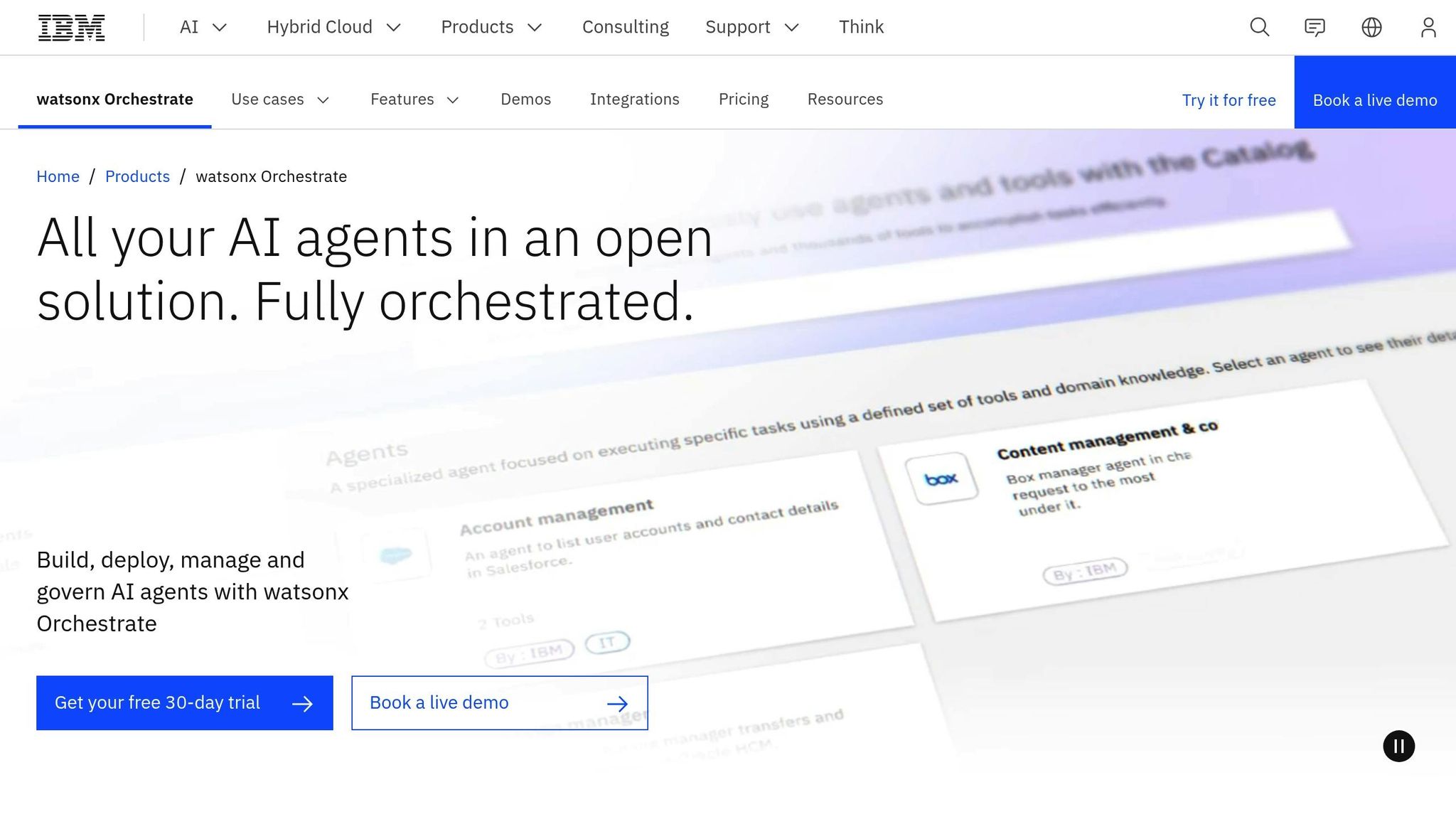
IBM watsonx Orchestrate provides powerful tools for auditing and reporting, ensuring transparency and accountability in AI operations, even in highly regulated environments. These features are designed to work seamlessly across various deployment setups.
IBM watsonx Orchestrate includes detailed audit logs that track events and activities within the system. As highlighted in IBM Documentation, these logs play a critical role in monitoring system performance, diagnosing potential issues, maintaining compliance, and investigating security concerns.
For deployments on IBM Cloud, the IBM Cloud Activity Tracker is used to monitor essential events, while AWS environments rely on external logging to capture both build-time and runtime activities. Additionally, a wide range of trackable events is available for skill-based experiences, giving compliance teams full visibility into user interactions across diverse environments.
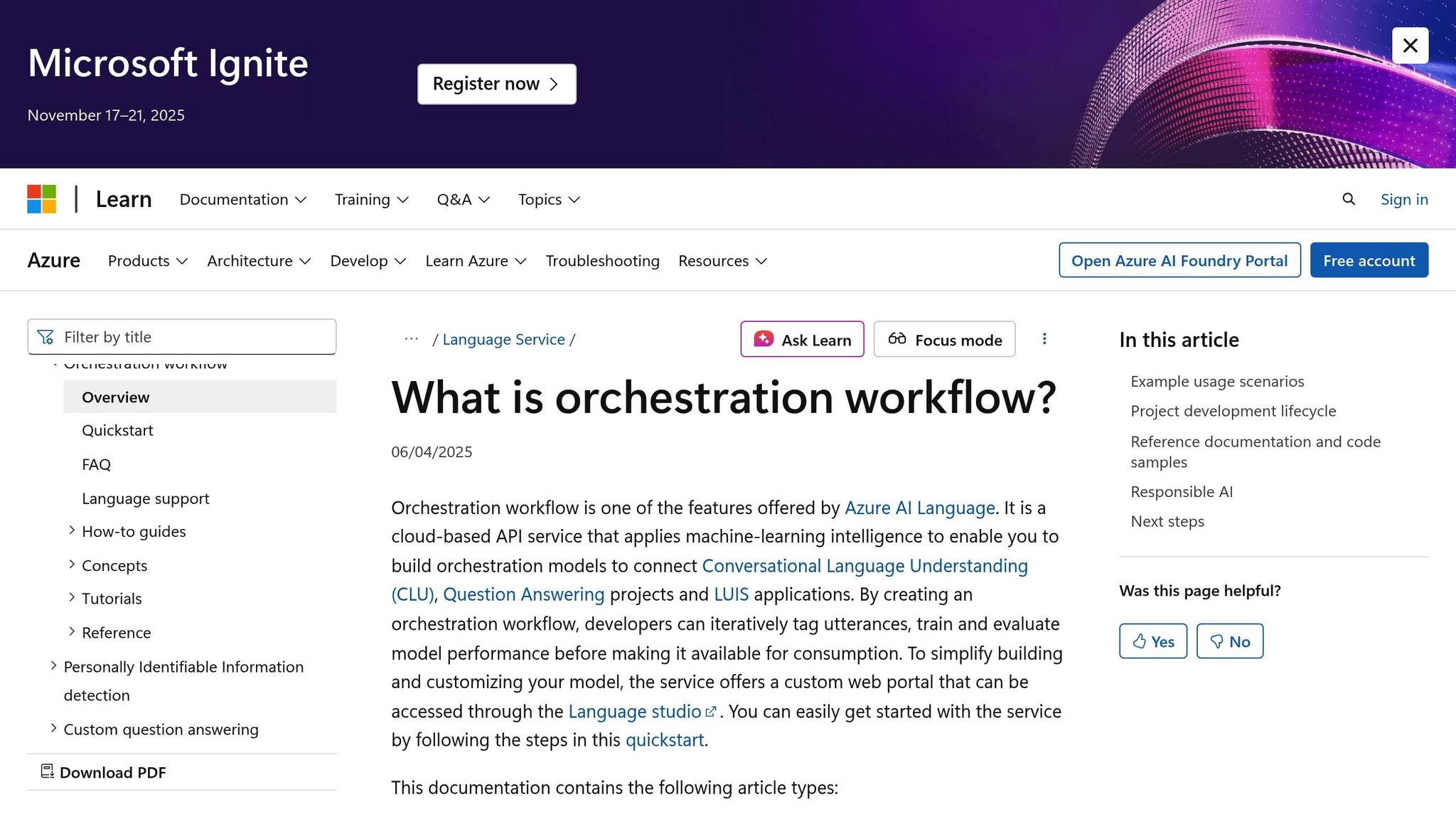
Microsoft Azure ML Orchestration combines compliance-focused tools with powerful workflow management to meet the demands of enterprise-level machine learning. It ensures regulatory adherence while providing flexibility for diverse operational needs.
Azure ML Orchestration is built to align with major regulatory standards such as GDPR, HIPAA, and SOC 2, ensuring organizations can meet compliance requirements seamlessly. The platform enforces data governance policies throughout the machine learning lifecycle, safeguarding sensitive information during both training and deployment phases.
One standout feature is its automated compliance checks, which validate workflows against regulatory standards before execution. This proactive measure helps catch potential issues early in the process, reducing the risk of violations. For added flexibility, organizations can create custom compliance rules tailored to their industry needs, ensuring a governance setup that fits their specific requirements.
Another critical tool is data lineage tracking, which provides full visibility into how data moves through AI workflows. This transparency is vital for organizations that need to maintain detailed audit trails and prove regulatory compliance through data provenance documentation. These compliance features create a strong foundation for managing complex workflows.
Azure ML Orchestration is designed to handle multi-step AI workflows that integrate seamlessly across Azure services and external systems. The platform supports both batch and real-time processing, allowing organizations to build pipelines that accommodate diverse data volumes and processing needs.
With pipeline versioning and rollback options, teams can experiment with new models while maintaining stable production environments. The platform automatically manages dependencies between components, minimizing risks like incompatible service versions or missing resources that could disrupt workflows.
Azure ML Orchestration also connects effortlessly with services like Azure Data Factory, Azure Synapse Analytics, and Azure Cognitive Services, enabling unified workflows. This integration eliminates data silos, allowing organizations to leverage multiple AI and analytics tools within a single orchestration framework.
Audit capabilities are enhanced through integration with Azure Monitor and Application Insights, which log every workflow activity, including user actions, system events, and data processing. These immutable records are essential for forensic analysis and regulatory reporting.
The platform also generates automated reports summarizing activities, resource usage, and security events. These reports can be customized to fit specific regulatory frameworks and exported in various formats for external submissions or internal reviews.
For real-time oversight, monitoring dashboards provide immediate insights into workflow performance and compliance. Alerts can be configured to notify teams of deviations from set parameters or potential security risks. These features ensure organizations maintain secure and compliant AI operations.
Azure ML Orchestration is designed with cost efficiency in mind, adopting a consumption-based pricing model. Organizations pay only for the resources they use, whether they rely on basic CPUs or high-performance GPUs for workflow execution.
Storage costs are calculated based on the volume of data processed and retained, with options to reduce expenses through automated data lifecycle policies. These policies can move older datasets to lower-cost storage tiers or delete unnecessary files after a set retention period.
Cost management tools are included, offering detailed expense breakdowns across workflow components. These insights help organizations identify opportunities to optimize spending, adjust resource allocations, and stay within budget while meeting performance goals.
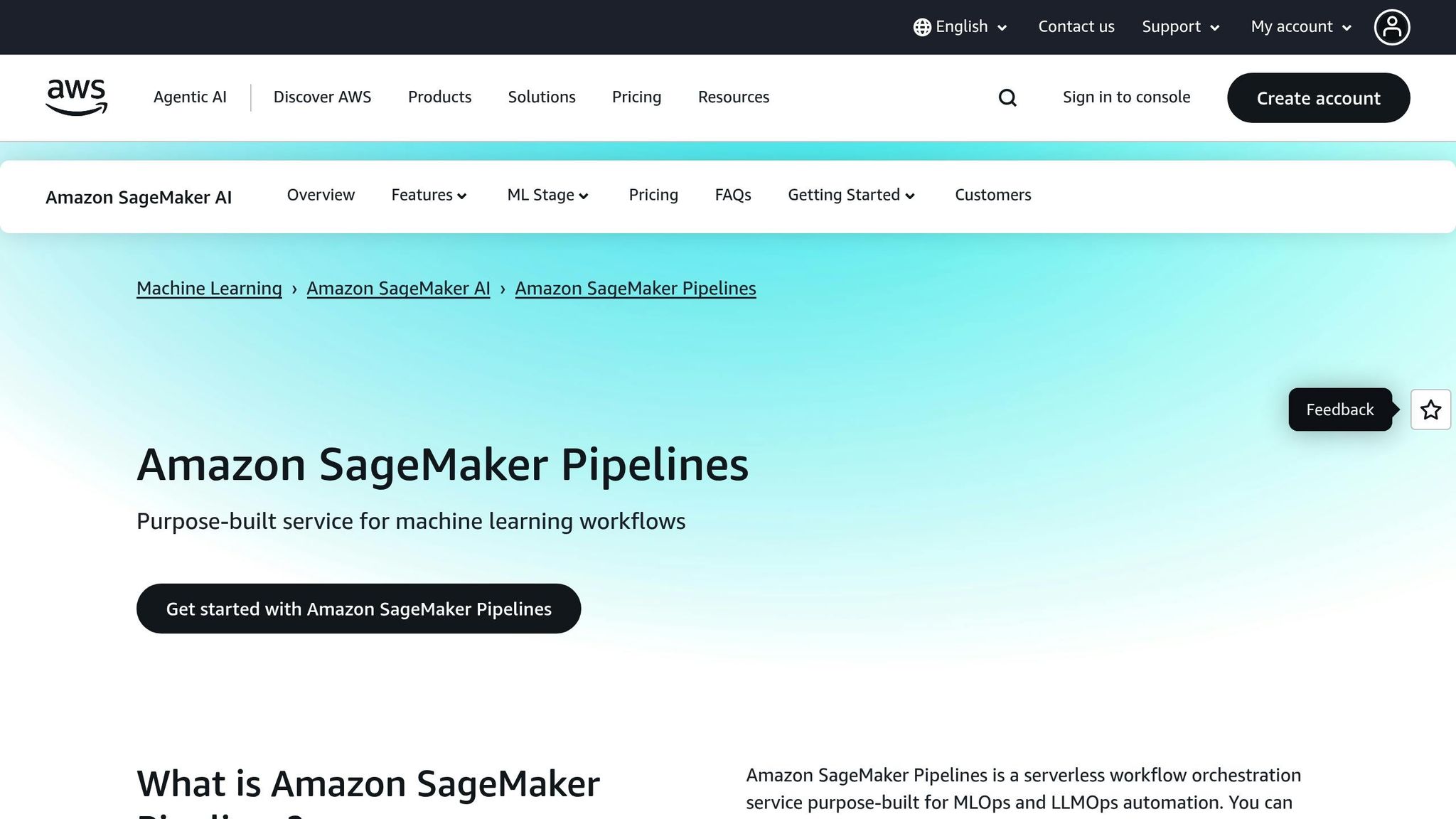
AWS SageMaker Pipelines builds on Amazon's cloud ecosystem to deliver advanced compliance and audit capabilities, making it a valuable tool for organizations navigating stringent regulatory requirements.
The platform emphasizes detailed audit trails and versioning, ensuring transparency and accountability throughout the machine learning lifecycle. Its features are designed to streamline compliance processes while providing robust tools for tracking and reporting.
SageMaker Pipelines automatically records every pipeline update and execution, creating a comprehensive log of changes. Amazon SageMaker ML Lineage Tracking further enhances visibility by offering a complete view of data sources and consumers. This is particularly useful in regulated environments where demonstrating data provenance is a critical requirement.
In addition to compliance tracking, AWS SageMaker Pipelines includes tools to simplify auditing and reporting. As noted by Amazon SageMaker AI:
"With Pipelines, you can track the history of pipeline updates and executions using built-in versioning. Amazon SageMaker ML Lineage Tracking helps you analyze the data sources and data consumers in the end-to-end ML development lifecycle."
The platform integrates seamlessly with Amazon CloudWatch, delivering near real-time metrics to monitor performance and system health. These metrics, such as endpoint invocation errors, model latency, and resource usage, are reported at 1-minute intervals, enabling quick issue detection. CloudWatch Logs automatically collects and organizes container outputs into log groups - like /aws/sagemaker/TrainingJobs or /aws/sagemaker/Endpoints/[EndpointName] - to document pipeline executions for auditing purposes.
Users can also review a detailed history of their workflows, including performance data and metadata. As highlighted by Amazon SageMaker Pipelines:
"View a detailed history of the workflow structure, performance, and other metadata to audit ML jobs that were run in the past. Dive deep into individual components of the end-to-end workflow to debug job failures, fix them in the visual editor or code, and re-execute the updated Pipeline."
These features collectively ensure that AWS SageMaker Pipelines supports compliance, enhances transparency, and simplifies the auditing process for machine learning projects.
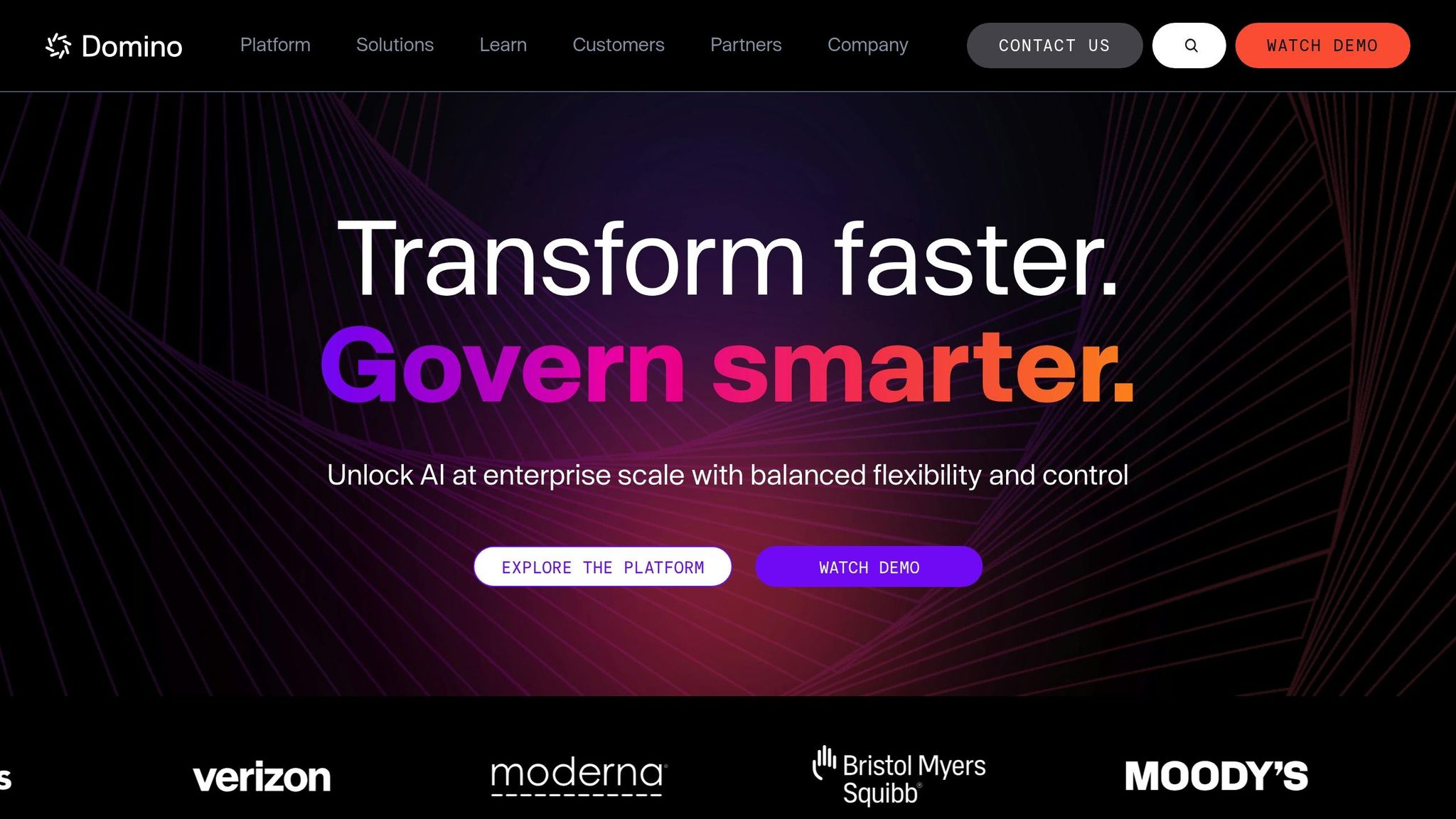
Domino Data Lab takes the integration of compliance and governance in AI workflows to the next level. Designed for enterprises, this platform ensures that regulatory standards are embedded throughout the entire AI lifecycle. By incorporating compliance controls directly into workflows, Domino helps organizations meet regulatory requirements from the outset.
The platform's credibility is backed by its numerous certifications, including SOC2 Type 2, GDPR, HIPAA, and ISO 27001, highlighting its commitment to security and compliance standards.
Domino Data Lab focuses on automating compliance and governance to reduce risks and simplify adaptation to new regulations. With Domino AI Governance, compliance rules are automatically enforced within AI workflows. This functionality is particularly valuable for adapting to evolving frameworks like the EU AI Act.
The platform's Domino Flows ensures workflows are traceable, versioned, and reproducible. These features make it easier for organizations to demonstrate compliance and manage audits, especially in sectors with stringent regulatory demands.
For secure access to large language models, Domino AI Gateway uses controlled API key management, logging all endpoint activities to enhance visibility and auditability.
Domino Flows optimizes multi-step workflows across the AI lifecycle by managing tasks efficiently and minimizing downtime. Its orchestration engine supports dynamic flow definitions, enabling the creation of interconnected workflows using loops and conditionals. These workflows can also be scheduled to run at regular intervals, automating repetitive tasks like model retraining, data processing, or compliance reporting.
These orchestration tools align seamlessly with Domino's emphasis on integrated compliance.
Domino's audit capabilities are designed to simplify regulatory adherence by ensuring complete traceability and reproducibility. The platform automatically gathers and organizes compliance documentation, streamlining the regulatory review process.
For enterprises in heavily regulated industries, Domino offers credential propagation solutions that maintain tight security while providing necessary access controls. Additionally, its robust logging and versioning features create an end-to-end audit trail - from data ingestion to model deployment - giving regulators and internal auditors all the documentation needed to confirm compliance.
Choosing the right AI compliance orchestration platform often comes down to weighing the benefits and trade-offs each option presents. These differences can significantly influence an organization's ability to meet regulatory requirements, manage technical needs, and stay within budget. Below is a breakdown of the key strengths, limitations, and ideal use cases for each platform, along with insights into pricing, compliance, and usability.
Prompts.ai takes a streamlined approach to cost management and compliance. Its pay-as-you-go TOKN credit system eliminates ongoing subscription fees, offering access to over 35 top-tier language models. This approach makes it a highly cost-effective solution for organizations seeking flexibility.
IBM watsonx Orchestrate is a standout for enterprise-level governance and regulatory compliance, backed by robust frameworks. However, its advanced setup can require significant technical expertise and longer deployment timelines, which may be a challenge for some teams.
Microsoft Azure ML Orchestration integrates seamlessly with the Microsoft ecosystem. Organizations already using Office 365 or Azure services benefit from smooth authentication, data governance, and compliance features. While its familiar interface and thorough documentation enhance usability, the platform's tight integration can complicate multi-cloud strategies.
AWS SageMaker Pipelines offers scalability and flexibility through its serverless architecture, which efficiently manages fluctuating AI workloads. Its machine learning tools and pre-built compliance templates speed up deployment, though teams may need AWS expertise to optimize costs and configurations.
Domino Data Lab focuses on lifecycle compliance management, automatically applying compliance rules within AI workflows. With certifications like SOC2 Type 2, GDPR, HIPAA, and ISO 27001, it’s well-suited for highly regulated industries. However, its enterprise pricing model may be less accessible for smaller organizations.
| Platform | Key Strengths | Primary Limitations | Best Fit |
|---|---|---|---|
| Prompts.ai | Cost efficiency, access to multiple models | - | Budget-conscious teams needing flexibility |
| IBM watsonx | Enterprise-grade governance, audit capabilities | Complex setup; longer deployment timelines | Large enterprises in regulated industries |
| Azure ML | Microsoft integration, user-friendly interface | Vendor lock-in; limited multi-cloud options | Microsoft-centric organizations |
| AWS SageMaker | Scalability, serverless architecture, ML tools | Requires AWS expertise; technical complexity | High-volume, tech-savvy teams |
| Domino Data Lab | Comprehensive compliance, automated enforcement | Higher costs; enterprise-focused pricing | Regulated industries needing strict compliance |
These distinctions play a critical role in operational efficiency and a platform's ability to meet stringent regulatory demands.
Pricing models vary widely across platforms. Prompts.ai relies on a flexible token-based system that ties costs directly to usage, eliminating the need for subscriptions. On the other hand, IBM watsonx and Domino Data Lab often require annual commitments with per-user licensing, which can become costly as teams grow. Cloud-based platforms like AWS and Microsoft offer granular pricing, but monitoring usage closely is essential to avoid unexpected expenses.
When it comes to compliance, platforms like IBM watsonx and Domino Data Lab cater to industries with rigorous audit and regulatory requirements. Prompts.ai emphasizes operational compliance and transparent cost management, making it ideal for organizations focused on efficiency. Cloud providers such as AWS and Microsoft offer broad compliance coverage but often require additional configuration to meet specific industry needs.
The learning curve also differs among platforms. Microsoft Azure ML benefits from the familiarity of existing Microsoft tools, while AWS SageMaker may require specialized cloud expertise. Prompts.ai simplifies onboarding with a user-friendly interface and resources like a prompt engineer certification program. By contrast, IBM watsonx and Domino Data Lab often demand more extensive training but provide dedicated enterprise-level support to ease the transition.
Based on our review of regulatory compliance and orchestration capabilities, here are tailored recommendations for various business needs and scenarios:
For budget-conscious organizations seeking flexible and affordable AI solutions, Prompts.ai stands out. With its pay-as-you-go TOKN credit system and access to over 35 top-tier language models, it enables businesses to cut AI software costs by up to 98% compared to traditional licensing models. This makes it a great choice for startups, creative agencies, and mid-sized companies looking for powerful and compliant AI tools without stretching their budgets.
For businesses in highly regulated industries that demand comprehensive governance frameworks, IBM watsonx Orchestrate is a strong contender. It prioritizes regulatory compliance with built-in governance and audit features, making it ideal for sectors where adherence to strict standards is a priority.
For organizations deeply integrated into the Microsoft ecosystem, Azure ML Orchestration is a natural fit. Companies already leveraging Office 365, Azure services, or other Microsoft tools will benefit from seamless authentication and unified data governance. However, it’s worth considering the implications of long-term reliance on a single vendor.
For high-performing teams with advanced technical expertise and the need for scalable AI operations, AWS SageMaker Pipelines offers robust support. Its cloud-native design efficiently handles fluctuating workloads, making it a practical option for organizations requiring dynamic and reliable AI workflows.
For industries with stringent compliance demands, Domino Data Lab delivers advanced security and regulatory features. While it may come at a higher cost, its emphasis on compliance makes it particularly valuable for sectors such as pharmaceuticals, medical devices, and financial services, where security and adherence to regulations are critical.
To make the best choice, organizations should evaluate their current infrastructure, regulatory requirements, and internal expertise. Selecting a platform that aligns with these factors ensures a seamless integration of compliance and orchestration capabilities, as highlighted in this analysis.
Prompts.ai offers a suite of comprehensive compliance tools tailored for businesses navigating stringent regulatory environments. These tools include secure API management, detailed audit logs, and flexible permission settings, all aimed at protecting sensitive information effectively.
To further enhance security, the platform features real-time threat detection, data leak prevention, and support for multi-modal workflows, ensuring operations remain both efficient and secure. Prompts.ai also aligns with major privacy regulations like GDPR, HIPAA, and CCPA, providing a reliable framework for compliance across diverse industries.
Prompts.ai operates on a pay-as-you-go TOKN credit system, allowing businesses to save as much as 98% compared to conventional licensing methods. This setup eliminates hefty upfront costs and rigid fixed fees, letting companies pay solely for the resources they actually use.
With costs tied directly to usage, this system empowers organizations to manage budgets efficiently while expanding their AI workflows effortlessly. It’s a smart choice for businesses aiming to cut expenses while maintaining high performance.
When selecting an AI compliance orchestration platform, it's crucial for businesses to consider their regulatory responsibilities alongside their current technological framework. Although federal AI legislation in the U.S. is still taking shape, core principles such as transparency, accountability, and fairness remain at the heart of compliance efforts. Keeping up to date with these developments is vital for staying ahead.
Organizations should also evaluate their infrastructure readiness - this includes examining data quality, integration capabilities, and how well their systems can support AI-driven workflows. Opting for a platform that aligns with globally recognized standards, such as ISO/IEC 42001 for AI management systems, can provide an additional layer of adherence to international best practices.
By combining a solid grasp of regulatory trends with a clear assessment of internal capabilities, businesses can choose a platform that not only ensures compliance but also integrates smoothly into their operations.


